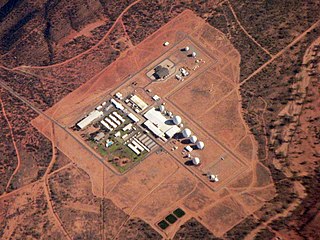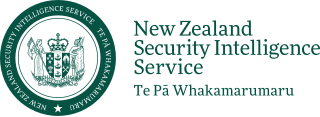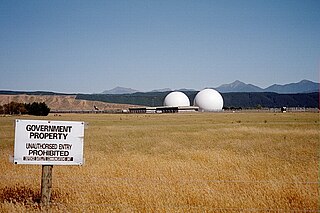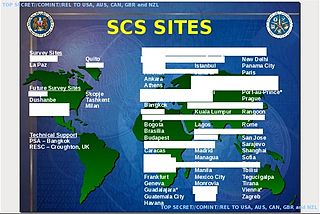Related Research Articles

ECHELON, originally a secret government code name, is a surveillance program operated by the five signatory states to the UKUSA Security Agreement: Australia, Canada, New Zealand, the United Kingdom and the United States, also known as the Five Eyes.

Pine Gap is an American satellite intelligence gathering and signal intelligence surveillance base and Australian Earth station approximately 18 km (11 mi) south-west of the town of Alice Springs, Northern Territory in Australia. It is jointly operated by Australia and the United States, and since 1988 it has been officially called the Joint Defence Facility Pine Gap (JDFPG); previously, it was known as Joint Defence Space Research Facility. It plays a crucial role in supporting the intelligence activities and military operations of the US around the world. The base's role has caused much controversy in Australia leading to various protests.
Waihopai Valley is an area near Blenheim in the Marlborough region of the South Island of New Zealand. The Waihopai River drains the area.

The New Zealand Security Intelligence Service is New Zealand's primary national intelligence agency. It is responsible for providing information and advising on matters including national security and foreign intelligence. It is headquartered in Wellington and overseen by a Director-General, the Minister of New Zealand Security Intelligence Service, and the parliamentary intelligence and security committee; independent oversight is provided by the Inspector-General of Intelligence and Security.

Royal Air Force Menwith Hill is a Royal Air Force station near Harrogate, North Yorkshire, England, which provides communications and intelligence support services to the United Kingdom and the United States. The site contains an extensive satellite ground station and is a communications intercept and missile warning site. It has been described as the largest electronic monitoring station in the world.

The Government Communications Security Bureau is the public-service department of New Zealand charged with promoting New Zealand's national security by collecting and analysing information of an intelligence nature. The GCSB is considered to be New Zealand's most powerful intelligence agency, and has been alleged to have conducted more espionage and data collection than the country's primary intelligence agency, the less funded NZSIS. This has at times proven controversial, although the GCSB does not have the baggage of criticism attached to it for a perceived failure to be effective like the NZSIS does. The GCSB is considered an equivalent of GCHQ in the United Kingdom or the NSA in the United States.

Tangimoana is a community in the Manawatū-Whanganui Region of the North Island of New Zealand. It had a population of 303 permanent residents in 2018. It is located 15 kilometres southwest of Bulls, and 30 kilometres west of Palmerston North.

The United Kingdom – United States of America Agreement is a multilateral agreement for cooperation in signals intelligence between Australia, Canada, New Zealand, the United Kingdom, and the United States. The alliance of intelligence operations is also known as the Five Eyes. In classification markings this is abbreviated as FVEY, with the individual countries being abbreviated as AUS, CAN, NZL, GBR, and USA, respectively.

Nicolas Alfred Hager is a New Zealand investigative journalist. He has produced seven books since 1996, covering topics such as intelligence networks, environmental issues and politics. He is one of two New Zealand members of the International Consortium of Investigative Journalists.
New Zealand's intelligence agencies and units have existed, with some interruption, since World War II. At present, New Zealand's intelligence community has approximately 550 employees, and has a combined budget of around NZ$145 million.
Shoal Bay Receiving Station is a signals intelligence-gathering facility in the Northern Territory of Australia located on the shores of Shoal Bay about 19 kilometres (12 mi) north-east of the Darwin CBD. The site is managed by the Australian Signals Directorate (ASD).
The Naval Communications Station Irirangi of the Royal New Zealand Navy, which is 2 km south of Waiouru and near the Waiouru Army Camp, was established in World War II (1943) as the Waiouru W/T Station. Its location, in the middle of the North Island, put it far away from the sea.

Canada–New Zealand relations are the international relations between Canada and New Zealand. Canada and New Zealand have a longstanding relationship that has been fostered by both countries' shared history and culture, and links between residents of both countries. The two countries are former British Dominions and have a common head of state in King Charles III. Both nations are members of the Asia-Pacific Economic Cooperation, Cairns Group, Commonwealth of Nations, Five Eyes, OECD and the United Nations.
Cyberwarfare by China is the aggregate of all combative activities in the cyberspace which are taken by organs of the People's Republic of China, including affiliated advanced persistent threat (APT) groups, against other countries.
Owen Ronald Wilkes was a peace campaigner and the founder of the Campaign Against Foreign Control of Aotearoa and the Anti-Bases Campaign, who was given a suspended prison sentence for espionage in Norway.
The Tangimoana Station is a radio communications interception facility run by the New Zealand Government Communications Security Bureau. It is located 30 kilometres west of Palmerston North.

The Waihopai Station is a secure communication facility, located near Blenheim, run by New Zealand's Government Communications Security Bureau. The station started operating in 1989, and collects data that is then shared with New Zealand's allies. In 2021, it was announced that the parts of the station would be deconstructed and removed from the site. Several protests and disputes surrounding its use and the wider implications of the information gathered has gained the facility some local and international notoriety.
Maire Leadbeater, is a New Zealand human rights and peace activist, writer, and former social worker. Leadbeater played a leading role in the New Zealand branch of the Campaign for Nuclear Disarmament and has also advocated on human rights issues relating to East Timor, the Philippines, and Indonesia. She also served as a councillor on the Auckland City Council and Auckland Regional Council.

STATEROOM is the code name of a highly secretive signals intelligence collection program involving the interception of international radio, telecommunications and Internet traffic. It is operated out of the diplomatic missions of the signatories to the UKUSA Agreement and the members of the ECHELON network including Australia, New Zealand, United Kingdom, Canada and the United States.

The Campaign for Nuclear Disarmament (CND) is an organisation that advocates unilateral nuclear disarmament by the United Kingdom, international nuclear disarmament and tighter international arms regulation through agreements such as the Nuclear Non-Proliferation Treaty. It opposes military action that may result in the use of nuclear, chemical or biological weapons, and the building of nuclear power stations in the UK.
References
- ↑ Bromby, Jocelyn (11 January 2000). "Group hopes for end to Waihopai base". The Press.
- ↑ Horton, Murray (July 2010). "Owen Wilkes' SIS file - Spies Play Hard To Get". Peace Researcher (40). ISSN 1173-2679.[ permanent dead link ]
- ↑ Falconer, Phoebe (14 May 2005). "Obituary: Owen Wilkes". The New Zealand Herald . Retrieved 16 September 2011.